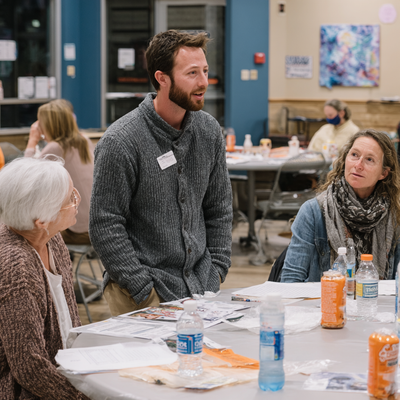So last month I'm sitting in this meeting with other kids ministry leaders and this woman starts talking about her volunteer team. How they hang out outside of church. How they cover for each other without being asked. How new people get absorbed into the group like they've always belonged.
I'm sitting there thinking... that sounds amazing. And also nothing like what I've got going on.
My volunteers show up Sunday morning. Do their thing. Leave. Barely know each other's names half the time. If someone doesn't show up it's just me scrambling to figure out coverage.
Made me realize I've been building a volunteer schedule instead of a volunteer team. Big difference apparently.
Started paying attention to ministries where volunteers actually stick around for years. Where people genuinely want to be there instead of just feeling obligated. Where it actually feels like family instead of just people doing jobs.
Turns out creating that kind of culture doesn't happen by accident. Takes some real intentional work. But man is it worth it when you get there.
It Starts with How You Think About People
Used to think of volunteers as positions to fill. Need someone for preschool check-in. Need someone for elementary small groups. Need someone for middle school chaos management.
People were basically interchangeable parts in my ministry machine. As long as slots got filled everything was fine.
Completely wrong approach.
Started thinking about volunteers as actual people with stories and gifts and struggles and dreams. Who happen to also help with kids ministry instead of people who exist to help with kids ministry.
Sounds like small thing but it changes everything. How you talk to them. What you ask about. How you make decisions.
When Jessica mentioned her daughter was struggling in school I actually followed up about it next week instead of just nodding and moving on to ministry business. Turns out that meant everything to her.
Create Opportunities for Real Connection
Volunteers who only interact during ministry time don't become a team. They become people who work the same shift.
Had to start creating chances for them to actually get to know each other as humans.
Started these monthly volunteer hangouts. Not meetings - hangouts. Sometimes coffee shop. Sometimes someone's backyard. Sometimes just pizza after service.
No agenda. No ministry talk allowed. Just time to be normal people together.
First few were awkward. People didn't know what to talk about besides church stuff. But after few months they were sharing about their kids and jobs and complaining about traffic and laughing about random stuff.
That's when I knew it was working. When conversations shifted from "How was your class today?" to "How's your mom doing after her surgery?"
Share Stories Not Just Information
Used to only communicate logistics with volunteers. What time to be there. Which curriculum we're using. What supplies they need.
Boring. Impersonal. Doesn't build any connection.
Started sharing stories instead. About kids who were impacted. About breakthrough moments. About funny things that happened.
Sent text few weeks ago about how Marcus - who usually never participates - led prayer time completely on his own. Volunteers were texting back their own stories about kids they'd seen grow.
People want to be part of something meaningful not just fulfill obligations. Stories help them see the bigger picture of what we're doing together.
Let People Bring Their Whole Selves
Some volunteers are naturally outgoing. Others are quiet. Some love chaos. Others need structure. Some are creative. Others are practical.
Used to try to make everyone fit same mold. Act the same way. Use same approach.
Huge mistake.
Now I celebrate differences instead of trying to eliminate them. Let Tom be the organized one who has supplies ready before anyone asks. Let Sarah be the creative one who turns every lesson into art project. Let Mike be the quiet one who connects with shy kids nobody else reaches.
Team gets stronger when people can be themselves instead of trying to be someone else.
Had volunteer who was worried she was too quiet to work with kids. Turned out quiet kids gravitated toward her because she didn't overwhelm them. Perfect match.
Create Traditions That Matter
Teams have inside jokes and shared experiences and things they do together that become part of who they are.
Started some simple traditions that give volunteers things to look forward to and connect around.
We always do birthday celebrations for volunteers during service. Nothing fancy but everyone stops what they're doing to sing and share something they appreciate about that person.
We have annual volunteer appreciation dinner that's become legendary because Tom always tells embarrassing stories about me from early days.
We started tradition of taking group photo first Sunday of each month. Volunteers actually request copies and post them on social media.
Little things but they create shared identity. Something that's ours together.
Handle Conflict Before It Destroys Everything
Teams have disagreements. People get frustrated with each other. Someone doesn't pull their weight. Someone oversteps boundaries.
Used to just hope problems would resolve themselves or people would work it out on their own.
Never happens.
Now I address stuff early before it becomes big drama that divides everyone.
Had two volunteers who had completely different approaches to behavior management. Started creating tension during service. Kids could feel it. Other volunteers were taking sides.
Called them both. Had honest conversation about finding middle ground that worked for everyone. Took some work but they figured it out.
Conflict that gets addressed early usually gets resolved. Conflict that gets ignored usually destroys teams.
Celebrate Wins Together
When good stuff happens make sure everyone knows about it and feels part of it.
Kid gets baptized who started coming because of our ministry? Share that with whole team.
Parent sends thank you note about how much their child loves coming? Read it to everyone.
Visitor says they're coming back because kids were so welcoming? Make sure volunteers know their work made that happen.
People need to see that what they're doing together is actually making difference. Celebrating wins reminds everyone why they're there.
Last month had parent tell me her daughter talks about "Miss Sarah" all week long. Made sure Sarah heard that but also made sure whole team knew one of our volunteers was making that kind of impact.
Give People Real Ownership
Teams work together toward shared goals. Employees just do what they're told.
Started giving volunteers real say in decisions about programming and direction instead of just asking them to implement my ideas.
When we were planning VBS asked team what themes they thought would work best with our kids. What activities they wanted to try. What problems we needed to solve from last year.
Their fingerprints ended up all over everything we did. Made them way more invested because it was their thing not just my thing they were helping with.
Now volunteers bring ideas to me instead of waiting for me to come up with everything. Feel like partners instead of helpers.
Be Vulnerable About Your Own Struggles
Leaders who pretend they have everything figured out don't create team culture. They create distance.
Started being honest with volunteers about things I was struggling with or learning or trying to figure out.
Told them when I was having hard time with particular kid's behavior and asked for their input. Admitted when lesson didn't go well and asked what they would try different.
Shared when I was feeling overwhelmed and needed their help prioritizing what was most important.
Vulnerability creates connection. When volunteers see you as human being who needs them and values their input instead of perfect leader who has all answers they become part of team instead of just people who help.
Make Sure Everyone Has Voice
Some volunteers are naturally vocal. Others hang back and don't speak up even when they have good ideas.
Had to learn to specifically ask quieter people what they think instead of just letting whoever talks loudest dominate conversations.
"Jessica what's your take on this?" "Tom I know you've been thinking about this - what do you think?"
Often the best ideas come from people who don't speak up first. But you have to create space for them and specifically invite their input.
Now our team decisions actually reflect everyone's thoughts instead of just whoever's most comfortable talking.
Invest in Their Growth
Teams where people are learning and growing and getting better stick together. Teams where people feel stuck don't.
Started asking volunteers what they wanted to learn or get better at. Then actually helping them do it.
Mike wanted to understand how to connect better with difficult kids. Connected him with mentor who's amazing at that.
Sarah wanted to learn more about childhood development. Got her signed up for conference that addressed that.
When you invest in people's growth they become more committed to team because they're getting something valuable out of being part of it.
Handle Turnover in Healthy Ways
People leave teams for all kinds of reasons. Job changes. Life changes. Moving. Burnout. Other commitments.
How you handle people leaving affects whole team culture.
Started doing proper send-offs for volunteers who are stepping away. Celebrate what they contributed. Share specific ways they made difference. Give them good memories of their time with team.
Also started doing better job of helping new people integrate instead of just throwing them in and hoping they figure it out.
Healthy turnover actually strengthens team culture because people see that everyone's contributions matter and new people get absorbed well.
The Stuff That Doesn't Work
Trying to force team culture with mandatory team building exercises. If it's forced it's not real.
Expecting culture to develop overnight. Takes months or years to build something that lasts.
Focusing on programs and systems instead of relationships. Culture is about how people relate to each other not how organized your processes are.
Treating everyone exactly the same instead of appreciating what each person brings.
Avoiding difficult conversations and hoping problems solve themselves.
What I'm Seeing Now
Volunteers covering for each other without being asked. Texting each other during week about kids they're concerned about. Bringing new people they've invited to join team.
People actually disappointed when they have to miss Sunday instead of relieved to have break.
Volunteers planning things together outside of what I organize. Having their own group text I'm not even part of.
New people getting absorbed into culture within few weeks instead of feeling like outsiders for months.
That's when you know team culture is working. When it starts happening without you having to manage it.
Still Learning
Don't have this figured out completely. Still make mistakes. Still have volunteers who don't quite fit. Still dealing with personality conflicts and scheduling challenges.
But the difference between having group of individual volunteers and having actual team is incredible. For the volunteers and for the kids and honestly for me.
Takes more time and energy than just filling slots with warm bodies. But teams that have real culture together accomplish way more and last way longer than groups of individuals just doing jobs.
Worth every bit of extra work when Sunday mornings feel like family gathering instead of work shift.
Watch YouTube
Listen to Podcast








